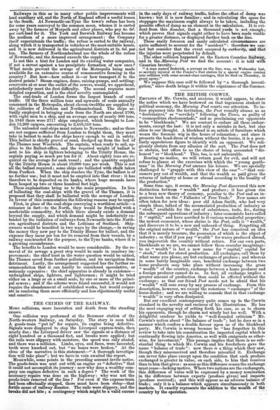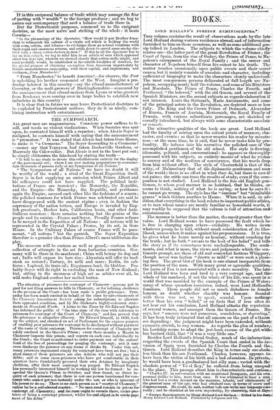THE BRITISH CORWIN.
Emmons of Mr. Corwin, and anxious, it would appear, to share the notice which we have bestowed on that ingenuous student in political economy, the Morning Post courts our attention. To in- fuse piquancy into the invitation, the Post roundly abuses us as "doctrinaires," as " servilely " following the Times, as guilty of "cosmopolitan rhodomontade," and as proclaiming our opponents to be "blockheads." We are content to endure all these endear- ments, except the last: it is not only a mistake in fact, but also alien to our thought. I blockhead is an article of furniture which wears the forensic wig in the hours of relaxation ; and since it presents the head-dress of wisdom without the brains, it is a pecu- liarly, opprobrious figure to identify with an opponent. We reli- giously abstain from any allusion of the sort. The Post does not so abstain, but offers to us the choice of being accounted " dis- honest " or "blockhead." This, too, is not unbearable.
Bearing no malice, we will return good for evil, and will not refuse to glance at the exercises with which the "young gentle- man" in the Morning Post amuses his leisure. We are specially challenged to "grapple with this view of the case "—" that con- sumers pay out of wealth, and that the wealth so paid gives the returns of industry at home or abroad according to the locality of the production." Some time ago, it seems, the Morning Post discovered this new distinction between " wealth " and produce ; it has given rise to a bran new theory of economy, peculiar to the Post and an in- genious book on the "Fallacies of Free Trade." New names are often taken for new ideas : poor old Adam Smith, who had very simple ideas, talked of the accumulated production of industry as "stock," available for the cost of subsistence, tools, &c., during the subsequent operations of industry ; later economists have called it "capital," and have ascribed to it various wonderful properties ; the newest economist, whose shrine is the Post, calls it "wealth," and discovers it to be a new and unheard-of thing. Forgetting all the original nature of "wealth," the Post has conceived an idea that it is merely treasure, the possession of which is the object of industry; so that if you pay "wealth" for wares produced abroad, you impoverish the country without return. For our own parts, blockheads as we are, we cannot follow these oracular imaginings : to us " wealth " is but a new name for "capital," capital for "stock," stock for stored production. All exchanges, call them by what name you please, are but exchanges of produce ; and whereas in some barely imaginable case, beneficial exchange between two home producers may take place without increasing the gross "wealth" of the country, exchange between a home producer and a foreign producer cannot do so. In fact, all exchange implies a greater amount of production than could be effected without the exchange; so that our friend Post needs not be afraid that his "wealth" will ooze away by any process of exchange. From this description, however, we except the notorious " exchanges " of the horse-dealer ; and we are willing to concede that in that exchange "wealth" is very often dissipated. But our excellent contemporary quite comes up to the Corwin standard in the novelty and raciness of his illustrations. He has the most engaging way of setting forth his ease, so as to charm his opponents, though he charm not wisely but too well. With a delightful candour he yields to "well-founded criticism" Mr. Corvrin's notion about "the balance of trade " ; but he does so in a manner which confers a double favour upon us of the blockhead party. Mr. Corwin is wrong because he "has forgotten in this review to take into his consideration the imported capital which is continually flowing into America, as well with emigrants as other- wise, for investment" This passage implies that there is no sub- stantial thing to which Mr. Corwin and his forefathers gave the name "balance of trade": now there is a thing which they saw, though they misconceived and therefore miscalled it. Exchange can never take place except upon the condition that each produce
exchan is greater in value, on each side, to him that receives than to o that gives: as soon as this difference ceases the exchange must cease—lacking motive. Where two nations are the exchangers, this difference of value will be expressed by a money nomination in the difference between exports (produce given) and imports (produce received); and this will appear as an adverse balance of trade ; only it is a balance which appears simultaneously in both markets. It exactly represents the addition to the wealth of the country by the operation.
iiithiX reciprocal bethinee-ofirade'.which may ammags;the fear of parting with f' Wealth-" ta thrforeigdproducer ; and we begto assure-ourcontemporary that tweira balance of 'trade there is.. But for Protectionist‘purposes; commend 'us to the emigrant doctrine,- as-.the most neve- and striking of the whole : it beate Corwin= "In the phraseology .of the- Spectator, .' Hajar would it-pay-Brother eons- than to relinquish- -hi culture of a virgin soil.whieh is feeding- the-world With corm cottom, and tobacco..televehange theme Lgo siliead- vocations with their rapidund enormous returns, and settlerdownAo crowd some smoky-dis-. triet with a cheap cotton-factory, system ? ' If this be all the Spectator has to say on this. subject, we be to refer him to an artielenf Ours which:Appeared about ten days ago, wherein weldursed 'clearly -that notton,mills might; and most probe y -would,. be-established in-favonruble.loeahtaesuf America, for the special purpose of obtaining exemption from American import.,cluty.by British..manufacturers emigrating, - withtheir capital, andlmplements,. and workmen,,frem Manchester)' "From- Manchesterm'to benefit America!—for observe;the -Past- is upholding his brother economist of the West. . Imagine a pro- , ducing-interest in this country—say the riband-Manufacturers of Ociventry, orthe malt-growers of linekinghamshire—reassured by the announcement that riband-makers from Lyons or wine-growers I from Bordeaux were coming -over in large- bodies to establish new industries in this -country I- It is clear that in- ftitare mayleave -Protectionist dectrines to be exploded by Protectionist- writers; they do it so- nicely; • com- bining instruction with entertainment.



























 Previous page
Previous page